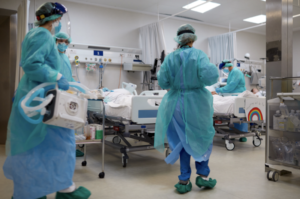Mar 28
Is your loved one hospitalized with Covid? 10 tips to help family members get through it

My Dad passed away from COVID pneumonia after 34 days in the ICU. When looking for information about what to do, what to expect, and questions to ask I found a lot of material for hospital workers but very little for family members. As a result I pulled together pieces of my experience in hopes of helping others going through a similar situation. The information I’m going to share is anecdotal, and since everyone’s response to COVID is different I will say upfront that not everything that happened to us will match your experience, but if only one thing does, it’s worth the read.
Nothing about this journey is easy – expect to question everything you thought was true; expect to be happy one minute then mad and sad the next; expect to be emotionally and physically exhausted; expect to feel overwhelmed by information one day and like you barely got an update the next – you are on a roller coaster and nothing can prepare you for the ride. However, if you can hold on to love from your support system and faith in something greater than yourself, the ride will end and regardless of the outcome you will be stronger for going through it.
-
Don’t wait to seek medical attention or hesitate to go to the emergency room if your symptoms include shortness of breath, low oxygen levels, diarrhea, or dehydration. Often these are late indicators of damage already done by the virus. Getting your family member to medical attention early can mean the difference between out-patient care and long-term hospitalization.
Despite my suggestion above, you cannot force someone to get medical care. My Dad was sick five days prior to my mother calling an ambulance to take him to a hospital. He was adamant he didn’t need medical attention despite his symptoms, which included inconsistent oxygen levels and stomach issues. He was also mumbling; everyone thought he was complaining under his breath, but more likely his lack of oxygen was causing incoherent speech. It was hard to recognize the difference, especially since his oxygen levels improved; then suddenly everything got much worse. This virus comes on slow and then very fast. Don’t wait.
-
Learn about options. Find out if monoclonal antibodies are an option for your family member. If your loved one has tested positive and shows any signs of difficulty breathing or severe stomach issues this treatment can keep them out of the hospital.
At the time of writing, a candidate for the antibodies must have a positive COVID test and be referred by their physician. Here is the link to COVID-19 Therapuetic Locator which includes a current list of monoclonal antibody distribution centers in Massachusetts.
-
Focus on what is possible. Given all of the contradicting information about alternative medicines and treatments for COVID, it is important to remember if you choose to send your family member to a traditional medical facility, you should expect and accept traditional medical care. If you are looking for treatments not approved by the CDC then it is important to find a non-traditional medical facility for your family member. When your loved one is in critical condition, decisions often need to be made quickly, arguing with doctors about unauthorized medicines and treatments wastes precious time and can mean the difference between life and death.
My family does a lot of research and knew every available traditional and alternative COVID treatment. There were many instances the information was helpful, however it can become a distraction during conversations with certain doctors. It’s important to ask about everything, but if your medical team indicates they aren’t able to provide your requested care because it doesn’t meet CDC guidelines, move on. The hospital is not going to risk their license because you want them to try something. Stay focused on the options available so you can make the best decision based on what is provided by your medical facility.
-
Trust your medical team. Be sure your family member is in a medical facility you trust. You need to be able to ask them anything, you need to know they will listen, and you need to be confident they will respect your wishes in the care of your loved one.
Most importantly, when the medical team knew my Dad wasn’t doing well, they respected my mother’s early wishes to keep him alive until she got there. Obviously they have medical and ethical obligations to follow family wishes but the care and kindness with which they follow through matters. My Dad’s medical team gave my Mom, brother and sister-in-law time to be with my Dad to hold his hand. They even removed all the tubes so my family could see and touch his face unobstructed. Those small acts of kindness mean the world to families and have made us life-long advocates of our local hospital.
-
Take lots of notes about your family member’s symptoms leading up to hospitalization and during their hospital stay. You will be inundated with information about your family member’s condition, you want to be able to watch patterns, inquire about medications and ask questions about doctor suggestions. This isn’t possible unless you are taking notes during every hospital interaction. I recommended two people be on every call or in every meeting, given the emotion of the situation, two sets of ears will allow you to record the most accurate information.
I took notes during each call, I set up a group text to share information with family members, and then I transferred all notes to a google spreadsheet. I sent everyone a link to the spreadsheet so if I wasn’t available for a call everyone would have the most up-to-date record of my Dad’s health and anyone could step in. This isn’t the time to control information, the more people that know what’s happening and can help, the better the situation will be.
-
Discuss your family member’s wishes while s/he is still conscious. Often COVID patients requiring oxygen have to be sedated to accept treatment and you won’t be able to ask later. Equally as often severe COVID patients will require intubation. It is vital to know your family member’s feelings about this step. It is not an easy decision in the moment, and equally difficult to decide if/when the tubes should be removed; knowing what your family member would want helps to make a horrible situation slightly more bearable.
We weren’t sure how my Dad felt about intubation, but since he had COPD I knew it was likely, so I had to ask. During our first hospital-assisted Zoom call my Dad was coherent and recognized the severity of his condition and said, “I will do what it takes.” I said, “Does that mean you want to be intubated if it is necessary?” He said, “Yes, I want to live. I will do what it takes.” Since my father had mentioned contrary feelings prior to being admitted to the hospital, it was important for me and my Mom to hear his wishes. Less than 48 hours later we would be forced to make that important decision; I was glad I asked.
-
Stay in touch with your family member. Since COVID protocols prevent family from visiting, you will need to find out if your medical facility offers remote visits (via Zoom or Facetime). Being there for your family member is important for them and for you. Keep in mind, this is a HUGE ask of medical professionals who are already over-worked. Every time they enter a COVID room they have to “suit up” in PPE, they have to make sure the iPad is charged, and they have to set up the device so you can see your loved one. All of this in addition to taking care of the medical needs of your family member (and others), working long shifts, and going above and beyond everyday. Be understanding and flexible about when and how often you talk to your family member and be kind to your medical team – they are angels.
We had a Zoom call with my Dad at least two days a week. During his 34 days in the hospital my father was only conscious during one of our calls, but the interaction kept us going and he responded well when we had them. He often showed improvements in his medical stats, and we always felt better after seeing him.
NOTE: Days and weeks of sedation and medications altered my Dad’s appearance, which was difficult for some family members to see. It’s hard to prepare mentally for these changes so you want to keep this in mind, especially if young children will be on the call.
-
Ask more questions. Although we felt like we received quality information about my Dad on a daily basis, it was out of context because we didn’t have a true sense of his condition when he went in – he was taken to the hospital in an ambulance and due to COVID protocols no one could be with him when he was admitted. It’s important to schedule time to meet with your loved one’s medical team to understand your family member’s status. Organize your questions (and those of additional family members) and schedule regular meetings with the hospital soon after s/he is admitted and throughout his/her stay. This is your time to ask ALL the questions you have.
In the beginning we were in shock responding to the reality of my Dad’s hospitalization, and distracted by our efforts to keep my Mom out of the hospital, we didn’t think about asking for a meeting. During the second week, the medical team requested to meet with us. At that time, my Mom wasn’t ready to hear any negative information about my Dad so we stayed away from tough questions during that meeting. We had another meeting schedule for the day my Dad passed away. Although it is unlikely knowing more would have changed the end result, it would have helped us be prepared for all the possible outcomes. Included here is a list of questions for you to consider.
-
Remember hindsight is 20/20. Don’t expend precious energy looking back and asking “what if.” With COVID it is easy to look back and question your decisions as you watch your loved one’s condition worsen with this disease. You have to make decisions in the moment given the information you have, and you need to remind yourself you are doing the best you can with what you know.
-
Keep the faith. Regardless of your beliefs, hope and faith are key to sanity during the roller coaster that is COVID. The doctors will tell you there will be good days and there will be bad days. Be prepared for both and remember miracles happen everyday. Every person reacts differently to the disease. You can remain informed and realistic while holding on to hope and praying that your loved one will recover.
 Laura Treonze, serves as Chief Life Strategist with LMT Consulting, which helps executives and teams create massive success through self-awareness. Her life-changing approach has transformed individuals and families and has redefined the way non-profits and corporations “do” business.
Laura Treonze, serves as Chief Life Strategist with LMT Consulting, which helps executives and teams create massive success through self-awareness. Her life-changing approach has transformed individuals and families and has redefined the way non-profits and corporations “do” business.
Categories Uncategorized | Tags: